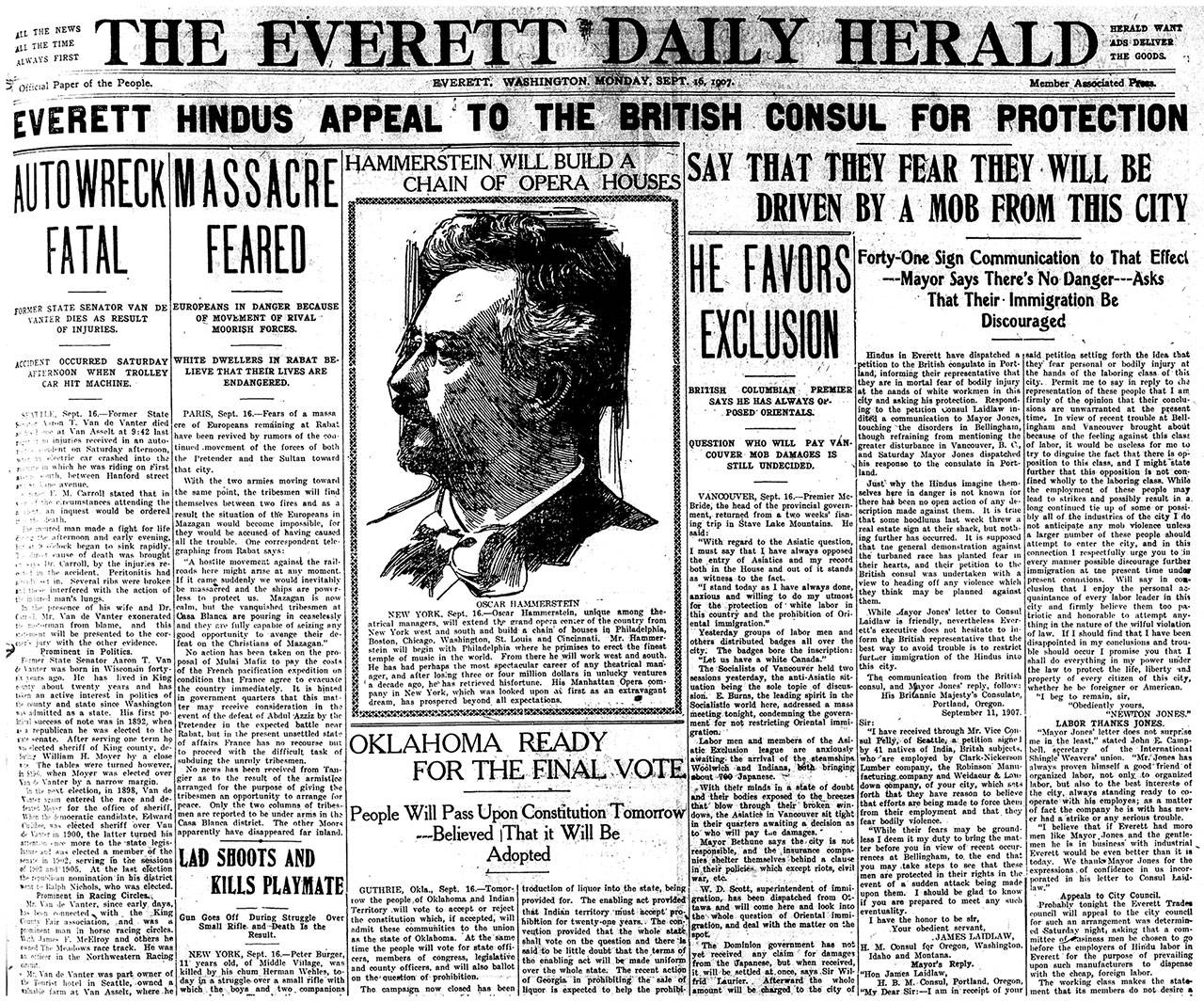The race riots began late that summer in Bellingham. On the night of Sept. 4, 1907, as police in that city mostly stood aside, a mob of white men estimated at 500 swarmed the homes and workplaces of South Asian migrant mill workers and their families. They drove many into the streets half naked and beat and stoned some before rounding up and marching about 200 to the county jail “with the evident intention of terrorizing them that they would gladly leave the city,” according to a front-page report in the next day’s Herald.
“The trouble has been brewing for a number of days and is caused by local mill owners employing the foreigners, because they can be had for less wages than is demanded by the local men,” the story read.
The violence against foreign workers, mostly from the Punjab region of then-British India, soon spread throughout the Puget Sound area, with attacks also reported in Seattle and Vancouver. The immigrants had arrived in Washington that year to fill a shortage of labor and a boom in the lumber industry, partly fueled by the rebuilding of San Francisco after the previous year’s earthquake and fire. Now, many began fleeing the region.
In Everett, the newspaper reported, the working class didn’t want to see a repeat of the violence in Bellingham but did desire “driving all aliens from the City of Smokestacks.”
Indian mill workers living in Everett feared the worst. Less than two weeks after the Bellingham attacks, the Herald reported that 41 “Hindu” residents of the city had written to the British consulate in Portland, expressing their “mortal fear of bodily injury at the hands of white workmen” and asking for protection.
Everett’s mayor, Newton Jones, downplayed the risk.
“I do not anticipate any mob violence unless a larger number of these people should attempt to enter the city and in this connection I respectfully urge you to in every manner possible discourage further immigration at the present time under present conditions,” he wrote in a reply to the consulate.
He was wrong about the violence.
On Saturday night, Nov. 2, “a mob of several hundred white laboring men and boys” gathered on California Street near the waterfront.
“All were sober and quiet,” the newspaper reported. Organizers told the chief marshal they wished to do the “Hindus” no harm, and that the demonstration was “merely to convince the foreigners they were not to be tolerated as workmen in Everett.”
“Yet it was intimated that unless (they) left immediately something worse than a mere demonstration might ensue.”
The mayor sent a telegram to the governor asking permission to call out the militia in the event of mob violence.
Armed guards took up post at area mills.
Later that night, the mob fired shots, threw stones and smashed the windows of shacks and bunkhouses occupied by the foreign workers.
By then, alerted to possible violence, authorities already had rounded up 34 Indians and put them in the county jail for protection.
About midnight, the mob marched to City Hall, where the mayor told them it was the city’s duty to protect the foreigners and it was the mob’s duty as citizens to aid the administration by dispersing, which they did.
But the damage had been done.
On Nov. 4, a Herald story noted that the city’s Indian workers were making preparations to leave Everett for British Columbia and Portland, “where they intend seeking new and more friendly pastures.” Those jailed for protection were released on the condition they leave Everett without delay.
“The Hindus went down with colors flying, bowing to the inevitable stoically, uncomplainingly, voicing no expressions of anger against their enemies, speaking nothing but regret that the white man to whose free country they came, refuses to permit them an opportunity to make a living,” the Herald reported.
Talk to us
> Give us your news tips.
> Send us a letter to the editor.
> More Herald contact information.

























